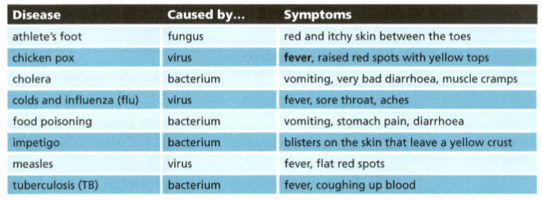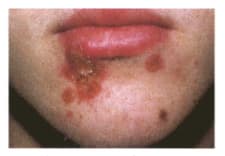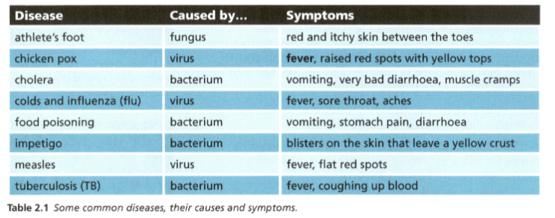Infectious Diseases
Important Questions on Infectious Diseases
Suggest two ways by which we can stop cholera disease from spreading.
Describe how cholera is spread from one person to another.
John Snow was an English doctor. In 1854, he wanted to know why people in London were dying of cholera. He recorded where people with cholera lived and noticed that many of them had homes near a certain water pump. This gave him an idea. He thought that if people stopped using this pump, then the number of people with cholera would decrease. The pump handle was removed, so people had to get water from other pumps. After this, the number of people with cholera decreases rapidly.
Read the passage about John Snow and answer:
(a) Suggest a scientific question he might have asked.
(b) What was his prediction?
(c) Suggest the conclusion that John Snow made.
(d) What evidence did he use to make his conclusion?
List some ways that can stop microorganisms from infecting?
Explain why you should use a tissue to sneeze into if you have a cold.
Why does cooking stop people from getting food poisoning?
Copy the diseases from table 2.1. Write down how each disease spreads.

Table 2.1
State an example of a disease spread by animals.
Why is Chickenpox, Common cold and Diphtheria are infectious disease?
State the name of an infectious disease.
Why are diseases caused by microorganisms are infectious?
Look at figure 2.10 and give a diagnosis.

Figure 2.10
A person with one of the disease in table 2.1 has red spots. What other information would a doctor need, to diagnose the disease?

Which disease has a symptom of coughing up blood?
Name a disease caused by a bacterium.
Mumps is a disease caused by a virus. It causes parts of your mouth to swell up and it is painful to swallow. Some people receive an injection to stop them getting this disease. What does the injection contain?
Name a disease caused by a virus.
Explain why we wash our hands with soap after using the toilet.
Colds and influenza (flu) are caused by
An infectious disease is one that

